Starting a podcast sounds exciting until you're staring at a blank page trying to figure out what to say. Don't worry, we've all been there. The truth is, even the most casual-sounding podcasts often rely on a solid podcast script behind the scenes.
A good podcast script helps you stay on track, sound confident, and connect better with your audience. And no, it doesn't have to feel stiff or robotic.
If you keep scrolling, you'll learn how to make a good podcast script that feels like a real conversation. With various podcast script examples and our expert tips, you'll be sure to be a master podcast script writer in no time!

In this article
-
- 🔹 Solo Commentary Script Example
- 🔹 Interview Show Script Example
- 🔹 Q&A / Listener Mail Script Example
- 🔹 True Crime / Narrative Script Example
- 🔹 News Roundup Script Example
- 🔹 Comedy Show Script Example
- 🔹 Educational / Explainer Script Example
- 🔹 Panel Discussion Script Example
- 🔹 Daily Motivation / Mindfulness Script Example
- 🔹 Branded / Business Podcast Script Example
Part 1. How to Write a Script for a Podcast That Sounds Natural
If you want to learn how to start a podcast script, the first thing you need is a good handle on the essential parts that make up a solid flow. A great podcast script doesn't have to be stiff or overly polished. It just needs to help you stay focused while keeping your personality front and center.
Here are the key parts that help guide the flow of your episode:
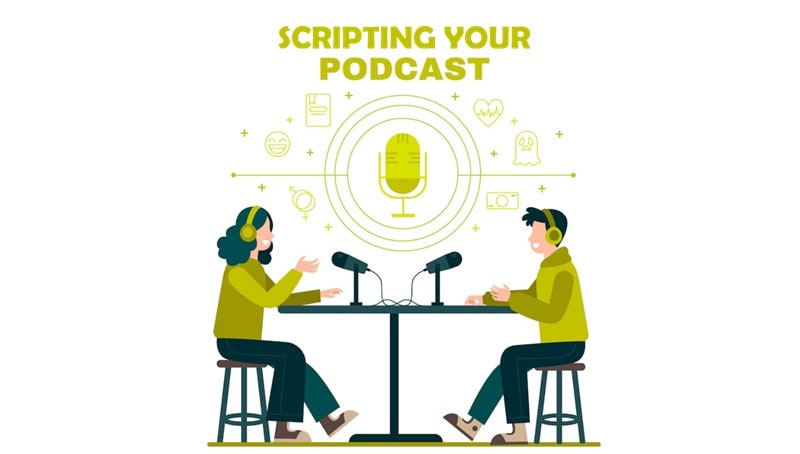
- Intro: When you're learning how to write a podcast script, nailing the intro is key. This is your first moment to connect, so make it count.
- Teaser: Give listeners a quick peek at what's coming up.
- The Meat: Whether it's an interview, personal story, or hot topic, this is the heart of your episode.
- Breaks: Add a little breathing room. This is where you throw in ads, shoutouts, or smooth transitions to keep everything moving naturally.
- Outro: Don't forget a friendly sign-off to end on a strong note. Wrap it all up with a quick summary and a clear call-to-action.
All these parts play an important role in any good podcast script. But writing a podcast script isn't just about ticking boxes or plugging in lines. It's about making it feel like a real conversation with your audience, not something you're reading off a script.
If you want your episodes to sound natural and keep listeners hooked, here's how to write a script for a podcast that feels easy, smooth, and totally true to your style.
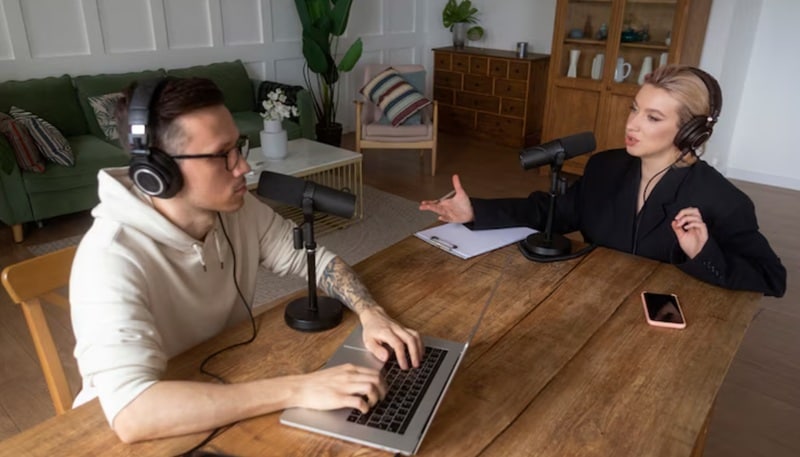
- Write the Way You Talk: Talk like a human, not a textbook. Forget grammar rules and fancy words. A good podcast script feels like you're talking to a friend, not reading an essay.
- Add Personal Stories or Little Ad-libs: These make your episodes feel relatable and unscripted, even if you planned them out. This is the key to how to make a podcast script that really connects.
- Include Timing or Tone Cues: Stuff like [pause], [laugh], or [take a breath] helps your delivery feel more natural and polished at the same time.
- Mix Up Your Pacing: Switch between short and longer lines to keep things interesting. A podcast script with a natural rhythm keeps listeners tuned in without zoning out.
- Leave Room for Reactions: If you're recording with a guest or co-host, leave space to react naturally. Your podcast script should guide the convo, not control every second of it.
- Test Read Before You Record: Read your script out loud before hitting record. It's the easiest way to catch weird phrasing and make sure your podcast script flows the way you speak.
Looking at all these points, it's easy to feel a little overwhelmed, and you might even feel discouraged to start. Good news is, you don't have to stress over every line or stare at a blank page for hours.
There are tools like Wondershare Filmora that make the process a whole lot easier. With its AI Copywriting feature, this all-in-one video editor helps you figure out how to write a podcast script that feels natural, organized, and totally you without overthinking every word.

Here's why Filmora might be just what you need to make writing your podcast script way easier.
So, here comes the good part because we're gonna show you how to make a good podcast script using Filmora's AI Copywriting feature. Just follow these easy steps and you'll be scripting like a pro in no time:
Step 1. Open Filmora and access the AI Copywriting feature
Start by getting the latest version of Filmora installed on your device. Once you're all set, launch the app and look for the "Toolbox" on the left side. Click on "AI Copywriting" and a new window will open.
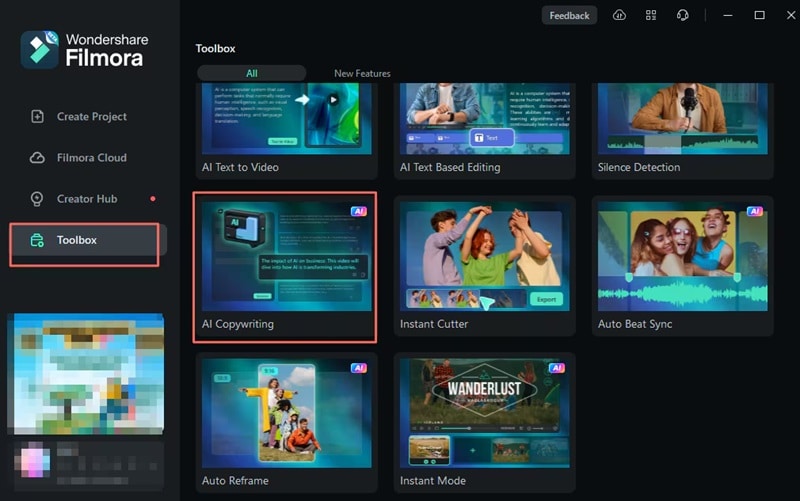
Step 2. Generate a podcast script
In the new window, pick "Video Oral Script" as the type of content you want. Type your idea into the "Video Topic" box, choose your language, and hit "Generate" to let the AI do its thing and write your podcast script.
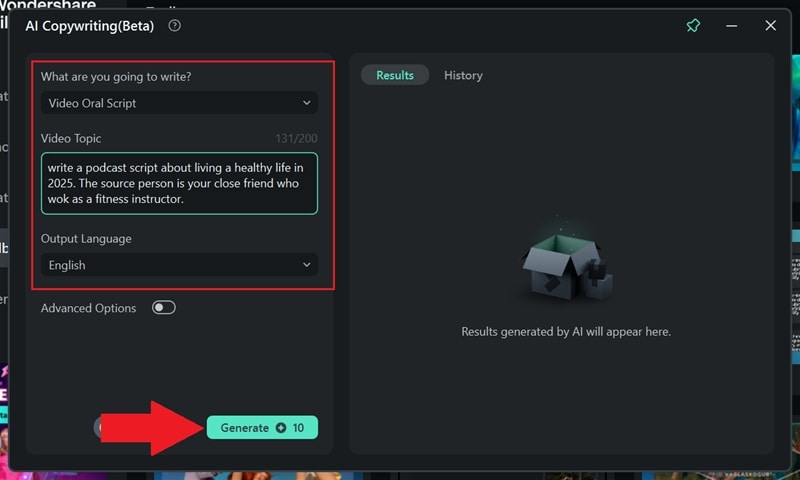
When the AI finishes, your script will show up on the right side of the screen. Filmora's AI Copywriting really delivers solid, original podcast scripts you can count on. Just copy the text and use it as your episode guide or tweak it however you like.
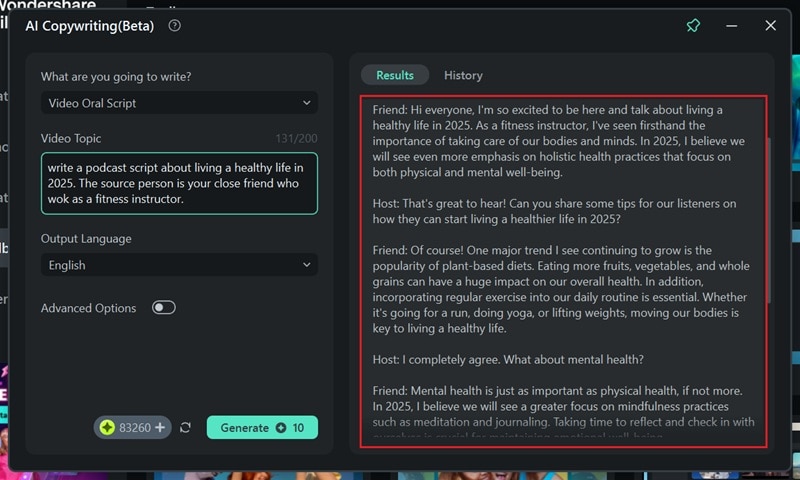
The results kind of speak for themselves, Filmora's AI Copywriting is perfect if you're figuring out how to write a script for a podcast quickly without losing quality.
And if you're in the mood to bring that script to life, try Filmora's AI Idea to Video, which effortlessly turn your ideas to finished video—all in one place.
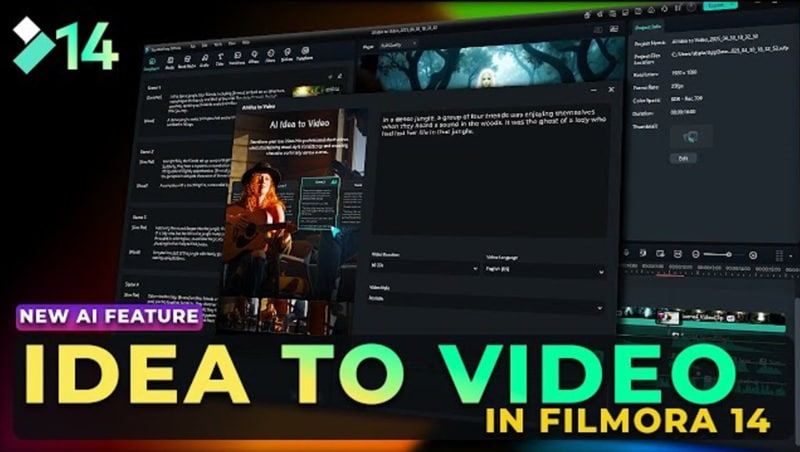
- Generate Script from a Prompt: Input a simple idea, and let the AI write the script for you.
- Auto-Build Scenes: The tool creates matching visuals and characters based on the script.
- Customize Easily: Replace visuals, voice, or music with your own assets if needed.
- Add Voiceover & Subtitles Instantly: AI handles voice and captions automatically.
- Export Ready-to-Share Video: Finalize your content as a complete video or podcast.
Just follow the simple steps and visualize your ideas today!
Part 2. 10 Podcast Script Examples for Different Show Formats
You can already feel how smooth this process is. With Filmora's AI Copywriting, writing podcast scripts is as easy as typing your idea and watching it turn into something solid.
That said, one of the fastest ways to level up your script game is by looking at real podcast sample scripts. Seeing how different formats flow in real life helps you understand the structure and vibe, so you can apply the same magic to your own podcast script.

So let's check out some podcast script examples for different types of shows and get those creative gears turning.
1. Solo Commentary Script Example
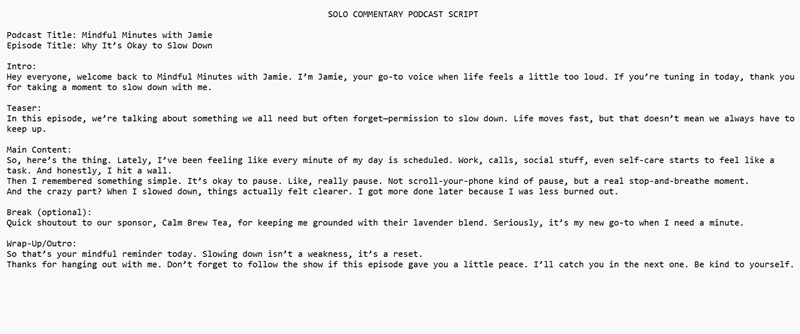
2. Interview Show Script Example
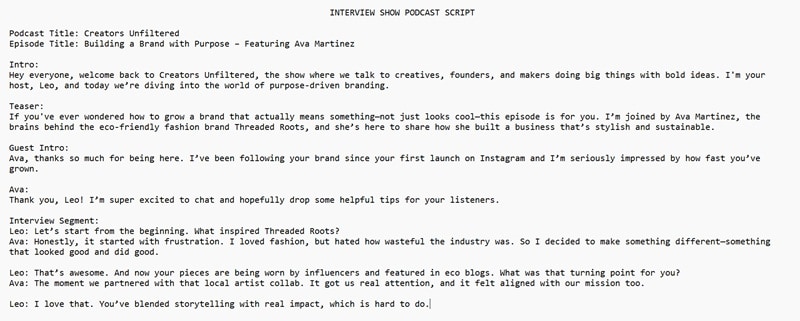
3. Q&A or Listener Mail Script Example
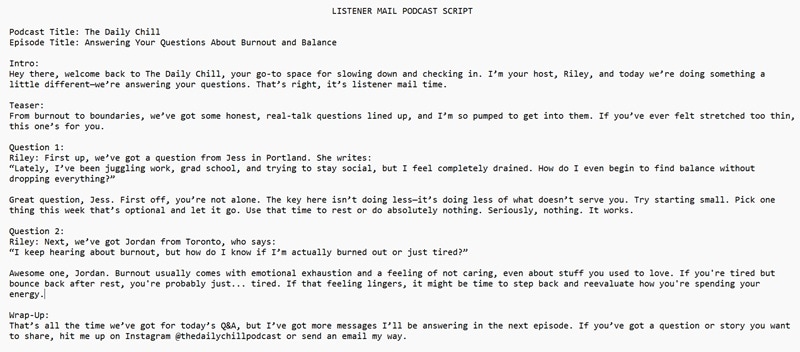
4. True Crime / Narrative Script Example
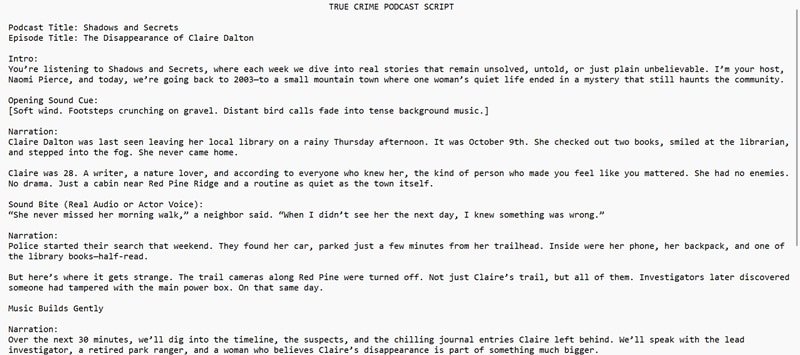
5. News Roundup Script Example

6. Comedy Show Script Example
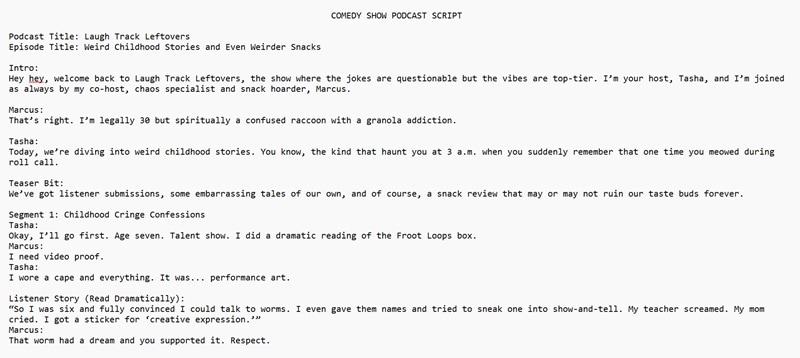
7. Educational / Explainer Script Example
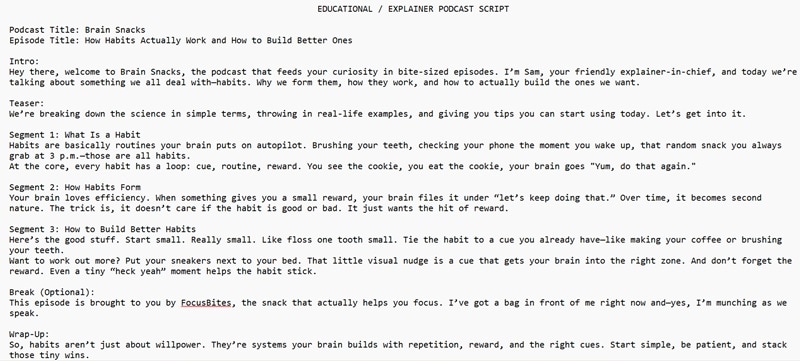
8. Panel Discussion Script Example
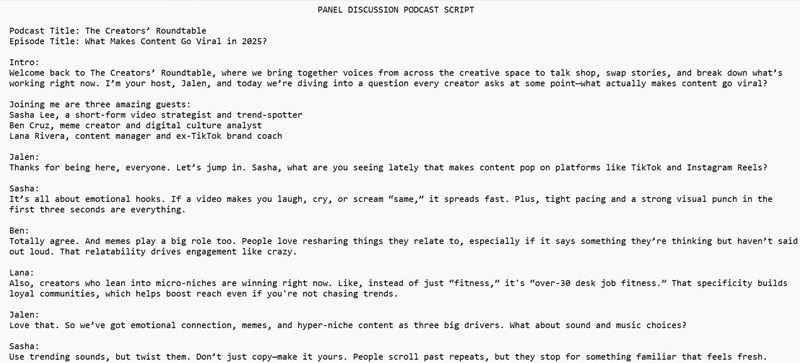
9. Daily Motivation / Mindfulness Script Example
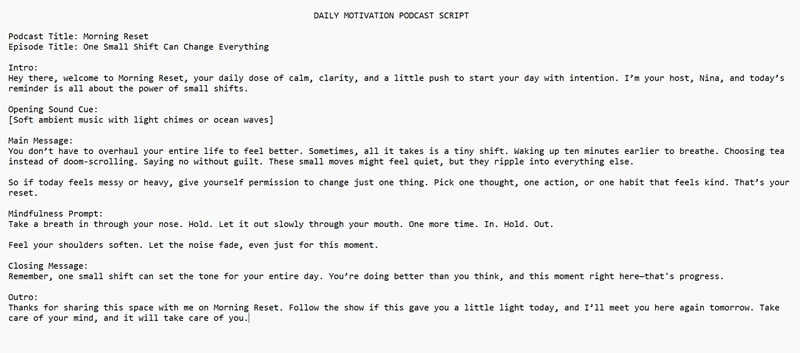
10. Branded / Business Podcast Script Example
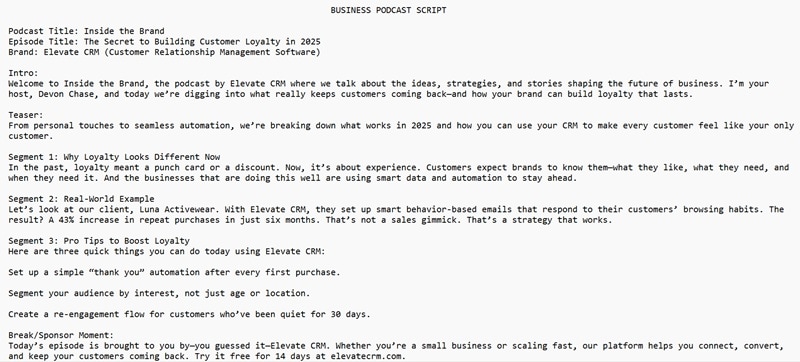
Bonus: Script vs Freestyle: Finding the Right Balance for Your Podcast
By now, you've seen how each example above can double as a solid podcast script template, ready to plug into your own show. So no matter what kind of topic you're tackling, you've got a head start and a clear direction.
And just so you know, some podcasters like having a full script. Others just talk freely. Most do a bit of both, and that works too. Below, we'll help you figure out how to balance structure and spontaneity in a way that works for you and your podcast style:
When a Full Script Works Best
Use a full podcast script when you're doing storytelling, narrative shows, or sponsored segments. It helps you stay focused, hit every point clearly, and keep the pacing tight. Read it out loud as you prepare to make sure it still sounds natural.

When to Use an Outline Instead
If you're hosting a casual chat, answering listener questions, or going on a solo rant, an outline gives you just enough structure without holding you back. List your intro, main ideas, and outro so you can speak freely while staying on track.

How to Blend the Two Styles
Start with an outline and fill in scripted parts where they matter most. That could be your opening lines, transitions, or anything you want to say just right. This keeps your podcast script clear without making it feel stiff.
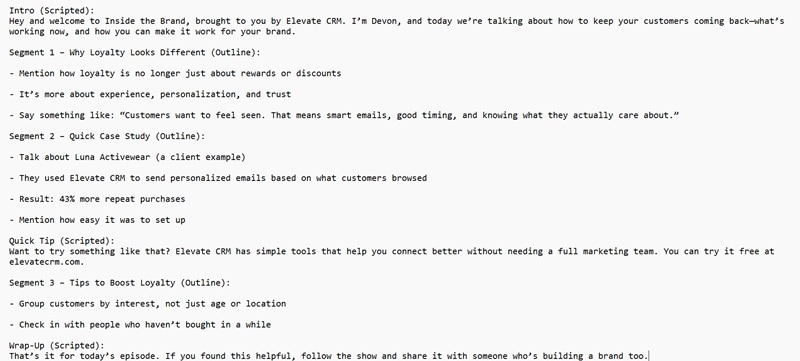
Signs Your Script Might Be Too Scripted
If your delivery sounds flat, overly rehearsed, or you find yourself tripping over formal phrasing, your podcast script might need a little breathing room. Try loosening up your wording, cutting long sentences, or switching parts of it into bullet points.

Conclusion
A solid podcast script is one of the secret ingredients to a great episode, and this guide highlights how to make a good podcast script in detail. From key elements and tips to keep things sounding natural to finding the perfect balance between scripting and freestyling, plus 10 podcast script examples to spark your own ideas, you've got everything you need right here.
And if you're figuring out how to write a script for a podcast without overthinking it, Wondershare Filmora makes it super simple. With its AI Copywriting feature, just type in your prompt and get a ready-to-use script that sounds like you. Plus, Filmora is packed with smart tools that make planning, editing, and even turning your script into a video feel quick, smooth, and actually fun.



 100% Security Verified | No Subscription Required | No Malware
100% Security Verified | No Subscription Required | No Malware


